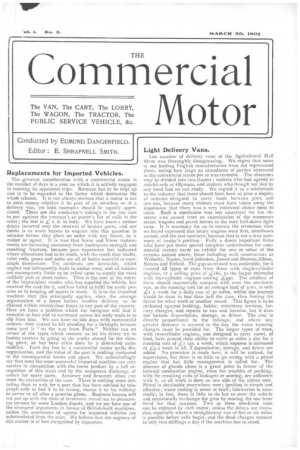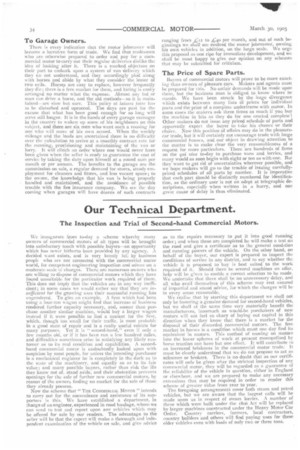Replacements for Imported Vehicles.
Page 1

Page 2

If you've noticed an error in this article please click here to report it so we can fix it.
The greatest consideration with a commercial motor is the number of days in a year on which it is actively engaged in running its appointed trips. Revenue has to be kept up and is to be regarded as the factor which dominates the whole scheme. It is not always obvious that a motor is out to earn money whether it be part of an omnibus or of a delivery van, yet both examples should he equally appreciated. There are the conductor's takings in the one case to put against the vanman's or porter's list of calls in the other; the test is s_ d. in both. We have known serious delays incurred over the renewal of broken parts, and our theme is to warn buyers to enquire into this question in advance before they place an order with any house, be it maker or agent. It is true that fewer and fewer replacements are becoming necessary from inadequate strength and resulting fracture, because past experience has indicated where alterations had to be made, with the result that shafts, valve rods, gears and axles are all of better material or more. ample dimensions. Yet accidents are inevitable, whilst neglect not infrequently leads to undue wear, and all makers are consequently liable to be called upon to supply the most unlikely part at short notice. Then is the user at the mercy of the improvident vendor who has supplied the vehicle, has received the cash for it, and has failed to fulfil the ready promise as to keeping an spares in stock. It is to the imported machine that this principally applies, since the average organisation of a home factory enables delivery to be effected within twenty-four hours in any part of the country. Here we have a problem which the foreigner will find it essential to face and to surmount unless his early trade is to slip from him. We can have no idle days with commercial motors—they cannot be left standing for a fortnight because some part is "on the way from Paris." Neither can an owner of the types which concern us let his driver try to hasten matters by going to the works abroad for the missing piece, as has been often done by a distracted automobilist. Each day lost by a commercial motor spells disorganisation, and the value of the part is nothing compared to the consequential losses and upset. We unhesitatingly say that even the most successful imported machine can only survive in competition with the home product by a full recognition of this truth and by the competent discharge of orders for spare parts. Accuracy and despatch alone can meet the necessities of the case. There is nothing more irritating than to wait for a part that has been advised by telegraph only to find it to be wrong, except it be for nothing to arrive at all after a promise given. Business houses will not put up with the class of treatment meted out to pleasure car owners by some London depots, and we see here one of the strongest arguments in favour of British-built machines, unless the assurances of agents for imported vehicles are substantiated from the start. We believe that the urgency of this matter is at last recognised by importers. Light Delivery Vans.
'Hie number of delivery vans at the Agricultural Hall Show was thoroughly disappointing. We regret that some at our leading English manufacturers were not represented there, seeing how large an attendance of parties interested in the commercial motor per se was recorded. The absentees may be divided into two classes : makers who had agreed to exhibit only at Olympia, and makers who though not tied by any bond had no van ready. We regard it as a misfortune to the industry that there should have been so poor a display of vehicles designed to carry loads bete een 3cwt. and one ton, because many visitors must have taken away the impression that there was a very restricted choice open to them. Such a conclusion was not unnatural for tne observer who passed from an examination of the numerous steam wagons and petrol lorries to the bare half-dozen light vans. It is necessary for us to correct the erroneous view we heard expressed that heavy wagons were first, omnibuses second, and the rest nowhere, because that is not a true summary of •to-day's position. Fully a dozen important firms who have put down special complete unclerframes for commercial motors made no exhibit for one or other of the reasons named above, these including such constructors as Wolseley, Napier,Arrol-Johnston, James and Browne,AIbion, Simms and Enfield. The gap so created was noticeable, for it covered all types of vans from those with single-cylinder engines, at a selling price of £180, to the larger examples with four-cylinder engines costing .L493. The smallest of these should successfully compete with even the one-horse van, as the running cost for an average load of 3cwt. is only a week for a daily run of 30 miles, whilst the journey would be done in less than half the time, thus freeing the driver for other work or another round. This figure is to be reckoned against bedding, fodder, veterinary services, farriery charges, and repairs to van and harness, but it does not include depreciation, storage, or driver. The cost is directly proportional to the mileage, and where any greater distance is covered in the day the extra running charges must be provided for. The larger types of vans, with two-cylinder engines, and designed to carry Loewe of load, have proved their ability to cover 50 miles a day for a running cost of ;,6-1 r5s. a week, which expense is increased to ;44 a week in all, if depreciation, storage, and driver are added. No provision is made here, it will be noticed, for supervision, but there is so little to go wrong with a petrol engine that but little management is called for. The absence of glands alone is a great point in favour of the internal combustion engine, since the troubles of packing, with the resulting evils of leakages or scoring, are unknown with it, as all work is done on one side of the piston only. Petrol is obtainable everywhere now; ignition is simple and effective; water cooling is never at fault; lubrication is automatic; in fact, there is little to do but to steer the vehicle and occasionally to change the gear by moving the one lever fitted for that purpose. Two or three one-horse vans can be replaced by each motor, unless the delays are excessive, especially where a straightaway run of five or six miles is possible before calls begin, and the dead charges amount to only two shillings a day if the machine has to stand.
To Garage Owners.
There is every indication chat the motor jobmaster will become a lucrative form of trade. We find that tradesmen who are otherwise prepared to order and pay for a commercial motor to carry out their regular deliveries dislike the idea of looking after it. There is a marked objection on their part LO embark upon a system of van delivery which they do not understand, and they accordingly plod along with horses and abide by what they consider the lesser of two evils. Horses are easy to replace, however frequently they die; there is a free market for them, and hiring is easily arranged no matter what the expense. Almost any lad or man can drive a horse, and the old methods—so it is maintained—are slow but sure. This policy of laissez faire has to be disturbed and uprooted. The days are past for the excuse that what has been good enough for so long will serve still longer. It is in the hands of every garage manager in the country to waken up some of his neighbours on this subject, and there are six men who want such a rousing for one who a ill move of his own accord. When the weekly mileage and the loads are ascertained there is no difficulty over the calculation to arrive at a monthly contract rate for the running, provisioning and maintaining of the van or lorry. It will clinch an order where one would never have been given when the seller is ready to guarantee the cost of service by taking the duty upon himself at a round sum per month or per annum. The benefits to the garage are the commission on sale, a regular demand tor stores, steady employment for cleaners and fitters, and less vacant space; to the owner, the knowledge that his van is being properly handled and maintained, and the avoidance of possible trouble with the fire insurance company. We see the day coming when garages will have dozens of such contracts
ranging from j;i2 to per month, and out of such be
ginnings we shall see evolved the motor jobmaster, owning his own vehicles in addition, on the large scale. We urge this proposal as one ripe for immediate development, and we shall be most happy to give our opinion on any schemes that may be submitted for criticism.
The Price of Spare Parts.
Buyers of commercial motors will prove to be more exacting than owners of pleasure cars. Makers and agents must be prepared for this. No unfair demands will be made upon them, but the business man is obliged to know where he stands. We have been struck by the huge divergence which exists between many lists of prices for individual parts and the price of a complete underframe with motor. In some cases the makers ask three times as much if you buy the machine in bits as they do for one erected complete ! Other makers do not issue any priced schedule of parts and apparently expect the buyer to take his chance or their choice. Now this position of affairs may do in the pleasure_ car trade, but it will certainly not encourage trade with large commercial houses, and our object in drawing attention to the matter is to make clear the very reasonableness of a request for more particulars. There are hundreds of firms on the qui vive to-day to purchase vans and lorries, and many would as soon begin with eight or ten as with one. But they want to get rid of uncertainties wherever possible, and we hope makers will go to the trouble of issuing carefullypriced schedules of all parts by number. It is imperative that each part should be distinctly numbered for identification, as the ordinary user is not an adept at telegraphic descriptions, especially when written in a hurry, and one great cause of delay is thus eliminated.
























